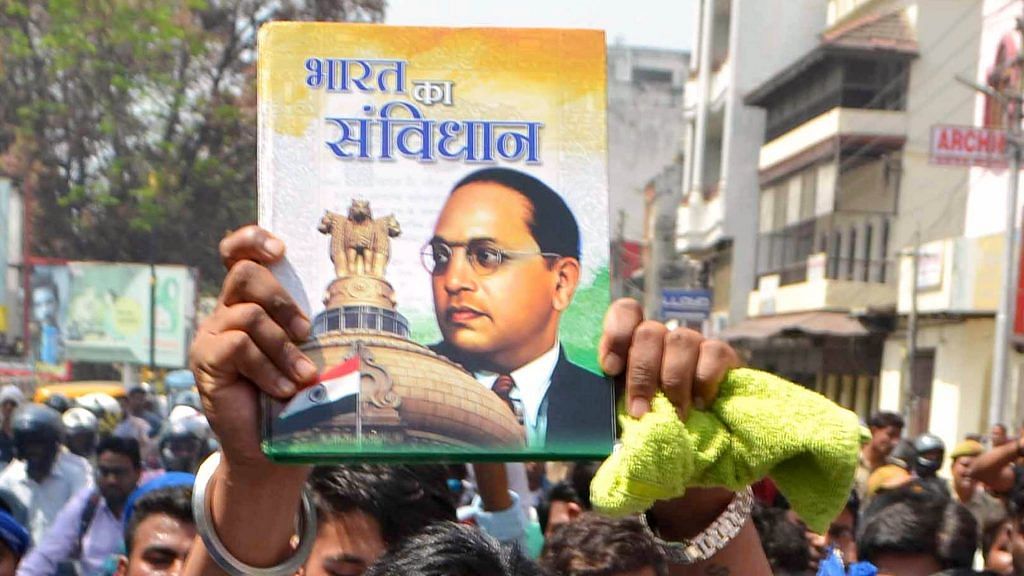A couple of weeks ago, an old friend informed me that he had decided to join the public protests against the Citizenship (Amendment) Act and the National Register of Citizens in his city. Like me, he is a staunch believer in constitutional methods in politics and policy change. We both like to quote B.R. Ambedkar’s famous “grammar of anarchy” injunctions against protests and civil disobedience. He was convinced that he was doing the right thing morally, but was uncertain of the constitutionality of it. He asked me what I thought about the matter. This is what I told him:
Let’s first parse what Ambedkar had warned against in his final speech to the Constituent Assembly in November 1949: “We must…hold fast to constitutional methods of achieving our social and economic objectives. It means we must abandon the bloody methods of revolution. It means that we must abandon the method of civil disobedience, non-cooperation and satyagraha. When there was no way left for constitutional methods for achieving economic and social objectives, there was a great deal of justification for unconstitutional methods. But where constitutional methods are open, there can be no justification for these unconstitutional methods. These methods are nothing but the Grammar of Anarchy and the sooner they are abandoned, the better for us.” (Emphasis mine.)
The key sentence in this important paragraph is the one where he points out that when there is no way left for constitutional methods, public protests are justified. After the Supreme Court repeatedly failed to uphold basic fundamental rights and balance the Narendra Modi government’s overreach, there is a question mark on whether there is any way left for constitutional methods. The religion-based criteria in the CAA is unconstitutional. When citizens wanted to protest against the bill, many state governments imposed prohibitory orders under Section 144 of the IPC and arrested protesters. Internet access was shut down in many places across the country. In some places, police action was blatantly unconstitutional.
When the government and law enforcement authorities are no longer constrained by constitutionality, and when the Supreme Court is unable to secure individual liberty, there is a case to argue that public protests are justified. Who decides whether the constitutional methods are open or not? Well, every citizen can.
Also read: For CAA-NRC protesters, the Constitution is a talisman and preamble the war cry
Democracy on a treadmill
As I have argued before, peaceful public protests are constitutional — in that every citizen enjoys the right to free expression — but are unconstitutional methods. Yet, when faced with a state going off the constitutional rails, public protests aiming to restore constitutional behaviour are justified. In fact, in their new book The Narrow Corridor, Darren Acemoglu and James Robinson argue that public protests are necessary, because institutions, separation of powers, and checks and balances do not always work.
“Liberty needs the state and the laws. But it is not given by the state or the elites controlling it. It is taken by regular people, by society. Society needs to control the state so that it promotes people’s liberty instead of quashing it. Liberty needs a mobilized society that participates in politics, protests when it’s necessary, and votes the government out of power when it can…For liberty to emerge and flourish, both state and society must be strong. A strong, mobilized society is needed to control and shackle the strong state.”
They go on to argue that being a liberal democracy is like being on a treadmill: the state and society must keep running to stay where they are. The state must continuously strengthen its capacity “to control violence, enforce laws, and provide public services that are critical for a life in which people are empowered to make and pursue their choices”. At the same time, society must constantly strengthen its ability to force the state to act within its constitutional bounds. By this measure, Indian society has been weak or negligent, and the current protests have been long overdue.
Also read: In Ambedkar’s ‘Proposed Preamble’ to Indian Constitution, there was no ‘equality’ clause
A necessary antidote
The anti-CAA/NRC protests are the first in my living memory of any sizeable public agitation that demands adherence to the Constitution, not a departure from it. The protests are not demanding special entitlements. They are not seeking exemptions or exceptions. They are rallying around the Constitution, waving the national flag and singing the national anthem. They are doing so peacefully in the face of disproportionate use of force by police in many places. Both the ends and means are justified from a constitutional point of view.
The onus is on institutions and holders of constitutional office to respond to the growing public outcry by reflecting on their actions and committing themselves to their proper roles. Civil servants and police officers must muster the courage do what the Constitution enjoins them to do, not whatever their political masters order them to. So too the judiciary. At a time when young men and women across the country are showing undaunted courage to face police lathis, surely those who are sworn to uphold the law ought to show some too.
So no, protests seeking a restoration of constitutional rule are not the grammar of anarchy. Rather, they are the antidote.
The author is the director of the Takshashila Institution, an independent centre for research and education in public policy. Views are personal.
